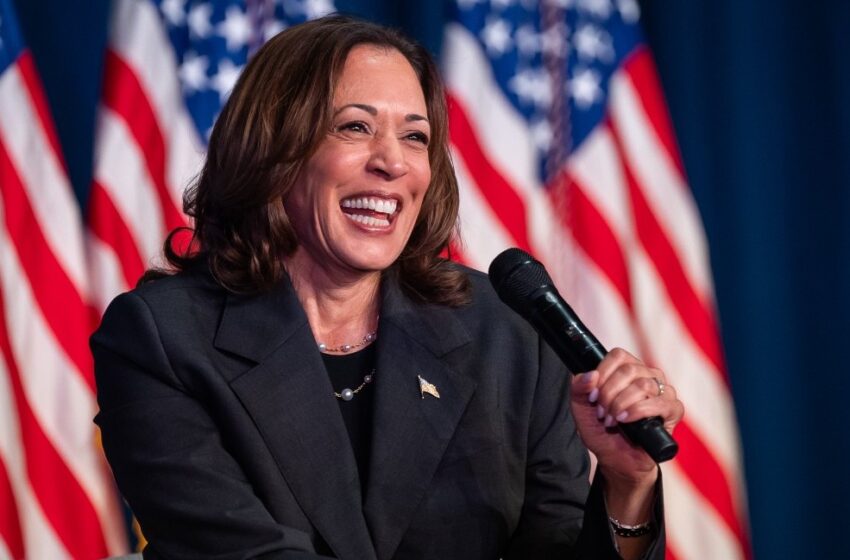Win or lose, Kamala Harris set to make history again

Vice President Kamala Harris
Win or lose, Kamala Harris, daughter of an Indian mother and a Jamaican father, both immigrants, is set to make history yet again as America heads to the polls Tuesday to elect its 47th President.
Democrat Harris, first woman, first Indian American and first African American Vice President and now the first South Asian on the top of a presidential ticket, is locked in an exceptionally tight race with her Republican rival, former President Donald Trump vying to make a staggering political comeback.
READ: Abhijit Banerjee, 80 other Nobel laureates endorse Kamala Harris (October 25, 2024)
Latest polls put Harris, 60, and Trump, 78, in a dead heat with the final New York Times/Siena College polls of the 2024 presidential election, looking at an essentially even race across the seven battle ground states likeliest to decide the presidency.
If Trump is up in Arizona (+4) and Michigan (+1), Harris is ahead in Georgia (+1), Nevada (+3), North Carolina (+3), and Wisconsin (+3), with both even in Pennsylvania – but all within the margin of sampling error.
Both campaigns have gone all out to woo South Asians numbering about 6.5 million, including about 5.2 million people of Indian origin, making up the second largest immigrant group, giving them an outsize political clout, especially in the battleground states.
AAPI Victory Fund co-founder Shekar Narasimhan estimates there are about 750,000 Indian American voters in four swing states — Michigan, Pennsylvania, Georgia and Wisconsin.
In Michigan and Georgia, there are more eligible South Asian voters than the margin of victories in the last election. In Pennsylvania, which Biden won by 80,555 votes in 2020, there are 85,000 eligible South Asian voters — according to an August report from AAPI Data.
Pennsylvania, which carries 19 electoral college votes, is the ultimate prize and has been the focus of much campaigning. Along with Michigan and Wisconsin, it forms a “blue wall” won by Barack Obama, lost by Hillary Clinton and won by Joe Biden. Trump is targeting rural blue-collar voters; Harris is aiming to turn out Black voters in big cities.
A recent Carnegie survey suggests 61% Indian American registered voters intend to vote for Harris with 32% likely to favor Trump — a slight uptick since 2020 — even as their attachment to the Democratic Party has dropped nine points from 56% in 2020 to 47% now.
The modest drift toward Trump appears to be driven by Indian American men, particularly young men born in the United States, according to the 2024 Indian American Attitudes Survey by the Washington think tank in partnership with research and analytics firm YouGov.
There is a new, striking gender gap in voting preferences, according to the survey. About 67% of Indian American women intend to vote for Harris while 53% of men, a significantly smaller share, say they plan to vote for Harris.
About 22% of women intend to vote for Trump while a significantly larger share of men, 39%, plan to cast their ballots for him. When further disaggregated by age, this gender gap appears starkest with younger voters.
Abortion and reproductive rights are a highly salient issue for Indian Americans this election year, ranking as their second-most-important policy concern after inflation/prices and tied with the economy and jobs, according to the survey.
While Harris has made reproductive rights and personal freedoms a rallying cry and backs a national law codifying access to safe abortion, Trump insists that it is a state matter and has ruled out a national ban.
On the issue of democracy, Harris has described her opponent as a fascist who has said he would be a dictator on day one, yet a recent Washington Post-Schar School survey of voters in seven swing states found that slightly more trust Trump to handle threats to democracy than Harris.
On economy despite strong growth, low unemployment and stabilising inflation, President Joe Biden and Harris have consistently trailed Trump in opinion polls.
Harris’s economic plans include tax cuts for most Americans, price-gouging bans, more affordable housing and a new child tax credit as well as efforts to boost domestic manufacturing. Trump has vowed to cut taxes, impose sweeping tariffs on imported goods and protect social security and Medicare.
On his signature issue of immigration, Trump has pledged what he calls the biggest deportation operation in US history, while Harris has shifted to the centre on the issue, underlining her support for a bipartisan proposal in Congress for more funding to control illegal border crossings.
Even as Harris and Trump made last minute appeals Monday to persuade undecided voters, crystal gazing as to the final outcome is complicated by the fact that about 75 million of the 186.5 million registered voters have already cast their ballots, either by mail or through early in-person voting.
Democrats held a wide advantage over Republicans in early voting four years ago, but the gap could be narrower this time as more Republicans have voted before Election Day with Trump giving up his aversion to it.
Voters register by party in four of the seven president battlegrounds and in each of those four, Democrats have cast a smaller share of pre-election ballots this year than at this point in 2020, according to CNN.
It may thus be a long Tuesday night before it becomes clear whether the first Desi President emerges with ‘Kamala Ke Saath’ or ‘Abki Baar Phir Trump Sarkar!’ — it’s again Trump this time!
